Business
Stop Interest Hiking, Experts Tell CBN As Apex Bank Raises Rate Again
Published
4 months agoon
By
Ekwutos Blog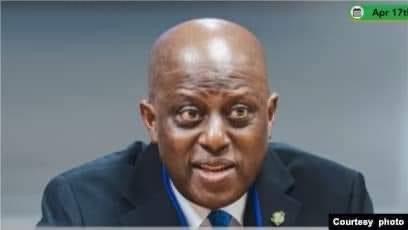
By Chris UGWU, Kasarahchi ANIAGOLU Nov 27 2024
Some financial experts have said that the CBN’s 25 basis points rate hike signals a potential pause in interest rate increases starting next year, emphasizing the need for relief for small businesses facing high financing costs.
The Central Bank of Nigeria (CBN) had raised its interest rate by 25 basis points, increasing it from 27.25 per cent to 27.50 per cent, in response to the country’s rising inflation.
This decision was announced by CBN Governor Mr. Yemi Cardoso, who also chairs the Monetary Policy Committee (MPC), following their meeting in Abuja.
The MPC unanimously agreed to the hike as part of ongoing efforts to address inflationary pressures in the economy.
The analysts in an exclusive interview with THE WHISTLER noted that despite the CBN’s tightening measures, inflation remains high, with benefits mainly seen in exchange rate stability due to foreign portfolio inflows.
They agreed that the rate hike was expected due to rising inflation, warning that it will increase business financing costs, which could be passed to consumers and further strain household budgets.
Reacting to the development, Nigeria’s first Professor of Capital Market, Uche Uwaleke indicated that the move might signal an imminent pause in the CBN’s aggressive monetary tightening cycle.
Uwaleke noted that the marginal increase aligns with analysts’ expectations, suggesting a potential shift in the CBN’s strategy.
“The marginal rate increase is a signal that the CBN may completely pause or apply the brake on interest rate hikes starting from the first quarter of next year,” he explained.
The professor emphasized the necessity of a pause, citing the rising cost of funds and its adverse impact on credit access, particularly for small businesses. “This needs to happen so that small businesses can breathe,” he remarked.
Despite the CBN’s sustained tightening measures, headline inflation remains stubbornly high, reversing recent gains and rising further.
Uwaleke observed that the benefits of the rate hikes have been most apparent in the foreign exchange market, where increased foreign portfolio inflows have contributed to exchange rate stability in the official window.
However, the broader economic picture remains concerning. The Q3 2024 GDP report released by the National Bureau of Statistics (NBS) showed weak performance in the agriculture and manufacturing sectors, a development Uwaleke attributed to rising interest and exchange rates.
He stressed the need for coordinated efforts between monetary and fiscal authorities to navigate the country’s macroeconomic challenges effectively.
“The current macro-economic challenges make it imperative for a proper synergy between monetary and fiscal policies,” he advised.
Managing Director of Arthur Steven Asset Management Limited and former President of the Chartered Institute of Stockbrokers (CIS), Mr. Olatunde Amolegbe also shared his views on the Central Bank of Nigeria’s (CBN) decision to raise the Monetary Policy Rate (MPR) by 25 basis points, moving it from 27.25 per cent to 27.50 per cent.
Amolegbe noted that the rate hike was widely anticipated, particularly given the National Bureau of Statistics (NBS) report showing inflation had increased by over 100 basis points in the previous month.
“The truth is that this was somewhat expected,” Amolegbe stated, acknowledging that many analysts had predicted this adjustment, with some even anticipating a higher increase due to ongoing price instability across various sectors of the economy.
He further pointed out that the government’s fiscal and structural measures, aimed at curbing inflation, have yet to yield immediate results.
“These measures typically take time to have the desired impact,” he said, adding that as a result, monetary policy has remained the primary tool available to the CBN in its efforts to stabilize the economy.
“This leaves us with monetary policy as the only effective tool to prevent the economy from spiraling out of control,” he explained.
However, Amolegbe also warned of the potential negative consequences of the rate hike on businesses and consumers.
“The likely impact of this move will be a further increase in financing costs for businesses,” he stated.
These higher costs are expected to be passed on to consumers, potentially raising prices on goods and services and putting additional strain on household budgets.
Amolegbe concluded by emphasizing the delicate balance the CBN faces in managing inflation and ensuring that the economy does not overheat, while acknowledging the challenges that persist in the broader economic landscape.
Managing Director of Highcap Securities Limited, Mr. David Adonri also weighed in on the Central Bank of Nigeria’s continued use of interest rate hikes as a tool to manage inflation, noting that while effective in the short term, it remains insufficient in addressing the underlying economic issues.
In an exclusive interview, Adonri explained that interest rate adjustments are a critical component of monetary policy designed to curb inflation until more sustainable fiscal measures can be implemented to address the structural causes of economic imbalance.
“Interest rates are a potent tool for managing inflation in the short term,” Adonri stated.
“However, their effectiveness is often limited when coupled with expansionary fiscal policies,” he added.
He further emphasized that the ongoing fiscal expansion, alongside factors such as insecurity and currency depreciation, continues to fuel inflation.
These persistent challenges leave the CBN’s Monetary Policy Committee (MPC) with few options but to maintain its contractionary monetary stance.
“As long as fiscal policies remain expansionary and the factors driving inflation persist, the MPC will have no choice but to continue raising interest rates,” he explained.
Adonri also cautioned that allowing inflation to spiral out of control would have devastating consequences for both consumers and producers. “The impact of unchecked inflation would be far more harmful than the effects of higher interest rates,” he warned, underlining the importance of the MPC’s approach in preventing further economic instability.
Despite the negative effects on certain sectors of the economy, Adonri acknowledged that the interest rate hikes provide a silver lining for investors in debt instruments.
“The bonanza for investors in debt assets will continue as the rates rise,” he noted, as higher interest rates typically make fixed-income investments more attractive.
In conclusion, while the CBN’s monetary policy actions are necessary to address the current inflationary pressures, Adonri stressed the need for a coordinated effort between monetary and fiscal policies to tackle the structural issues contributing to inflation and ensure sustainable economic growth in the long term.
Meanwhile, Cardoso called for critical synergy between the monetary and fiscal sectors of the economy to achieve price stability and curtail inflationary pressures on food and other commodities.
According to Cardoso, food prices remain a key driver of inflation, compounded by rising energy costs that affect production factors.
“The recent increase in the price of Premium Motor Spirit (PMS) has also impacted the cost of production and distribution of food items and manufactured goods.
“The Committee was optimistic that the full deregulation of the downstream sub-sector of the petroleum industry would eliminate scarcity and stabilize price levels in the short to medium term.
“Members, thus, reiterated the need to deepen collaboration between the monetary and fiscal authorities to ensure the achievement of our synchronized objectives of price stability and sustainable growth.”
Cardoso highlighted members’ concerns over persistent exchange rate pressures, driven by continued high demand in the market.
Cardoso expressed satisfaction with the resilience and stability of the banking sector despite significant external and internal challenges.
He outlined key financial soundness indicators, stating that the “Capital Adequacy Ratio (CAR), Non-Performing Loan (NPL) ratio, and Liquidity Ratio (LR), among others, remain strong.”
You may like


Champions League quarter-final: Arsenal thrash Real Madrid as Inter beat Bayern
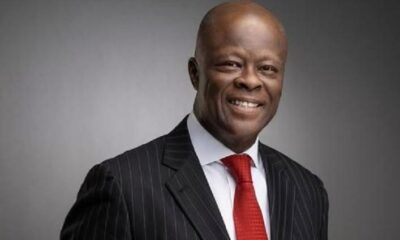

US tariffs won’t have much effect on Nigeria – FG


Wike hosts suspended Rivers lawmakers in UK
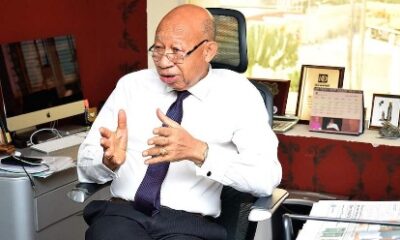

Pascal Dozie, Founder Of Diamond Bank Passes Away At 85


Tuface’s lover Natasha Osawaru replaced as Deputy Leader after shake-up in Edo Assembly


Nigeria seeks to host 2030 Commonwealth Games
Business
FCCPC Urges Nigerians to Report Harassing Loan Apps and Businesses
Published
2 days agoon
April 7, 2025By
Ekwutos Blog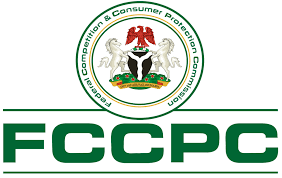
The Federal Competition and Consumer Protection Commission (FCCPC) is advising Nigerians to report any loan apps or businesses that engage in harassing behavior over unpaid loans.
According to the FCCPC, no consumer should live in fear of harassment or intimidation.
Ekwutosblog gathered that Consumers can file complaints with the FCCPC through their website or contact their customer service hotline.
The FCCPC is responsible for protecting consumer rights and promoting fair competition in Nigeria.
FCCPC has taken steps to regulate digital money lenders and enforce consumer protection laws, including fining Meta and WhatsApp $220 million for violating the Federal Competition and Consumer Protection Act (FCCPA) and the Nigeria Data Protection Regulation (NDPR)
To file a complaint, follow these steps
Visit the FCCPC website and fill out the complaint form. Provide detailed information about the harassment, including dates, times, and communication records. Submit supporting documents, such as screenshots or messages. FCCPC Website: https://fccpc.gov.ng/ Customer Service Hotline: 0805 600 2020, 0805 600 3030
Email: mailto:contact@fccpc.gov.ng
Business
Chief Vincent Obianodo is the Founder of Young Shall Grow Group, a leading transportation company in Nigeria.
Published
2 days agoon
April 7, 2025By
Ekwutos Blog
Chief Vincent was Born in Neni, Anambra State, He spent his early life in his hometown after which he moved to Kano state where He learnt how to fix punctured tyres (vulcanizer), and became perfect at it (a time when few people could do it), because of it he had a lot of customers queuing for his vulcanizing services.
He did the job for more few years before he decided to go into the transportation business as a bus conductor. He continued the bus conductor job until 1972 when he had gathered enough money to buy his bus. After acquiring maximum knowledge on how the transportation business works, he then decided to stop working as a bus conductor and he acquired a mini-bus to ply the Enugu to Onitsha route.
In 1973 he relocated his business operations from Onitsha to Lagos and ventured into a more developed transport business, which he started with two locally built Mercedes Benz 911 buses. After seven years of operating in Lagos, the number of buses he owned increased from 2 to 40 alongside his transport business. He also engaged in the delivery of goods which also boosted the success of his business.
His exceptional customer service delivery got many people to patronize his business and by 1978, he decided to expand by opening up a new interstate route, plying from Lagos to Onitsha to Owerri. He also bought a Mercedes Benz 0362 luxury bus for this purpose. This expansion gained his business more fame and within 6 years, his number of buses grew to 150. Owing to the success of the business, Chief Vincent Incorporated his business in 1984 so he could fully cover every possible part of Nigeria, as a leading inter-state luxury bus company.
Today, The Young Shall Grow Motors is one of the largest luxury bus companies in Nigeria with over 500 buses that ply almost every route in Nigeria as well as other west African countries like Ghana, Burkina Faso, Mali and The Benin Republic.
He also has businesses in the Hospitality, Oil and Gas, Real estate sectors.
From Vulcanizer to millionaire in dollars, today his net worth is over 300 million dollars.
Business
Dangote refinery, NNPC: More fuel stations increase pump price in Nigeria
Published
5 days agoon
April 4, 2025By
Ekwutos Blog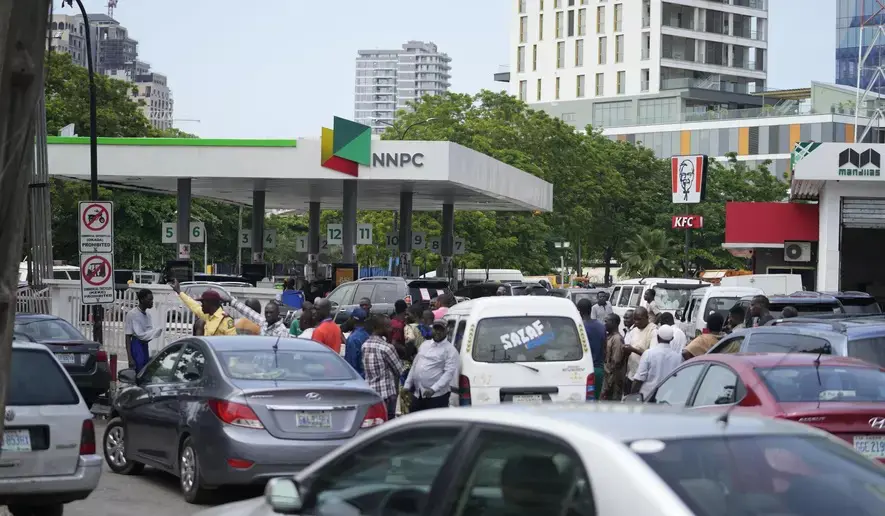
The price of Premium Motor Spirit, popularly known as fuel, has recorded a significant increase in the past days, which may worsen the economic hardship Nigerians face.
MRS, a filling station partner of Dangote Refinery, kicked off the latest fuel price increase when it adjusted its petrol pump to between N925 and N950 per litre in Lagos and the Federal Capital Territory, Abuja.
Similarly, other fuel marketers such as Empire Energy, Recoil, Juda Oil, Total, Emedab, and others also increased their fuel pump to between N950 and N970 per litre.
On Wednesday, the Nigerian National Petroleum Company Limited retail outlets also jacked up their fuel price to N950 per litre from N880 in Abuja.
Summarily, Ekwutosblog observed motorists will have to pay N70 more to buy a litre of petrol in the coming days.
The development comes amid the suspension of petrol product sales in Naira by Dangote Refinery. This follows the initiation of the naira-for-crude sale deal between Dangote Refinery and the federal government through NNPCL.
On Wednesday, President Bola Ahmed Tinubu announced a reshuffling of NNPCL.
Meanwhile, local oil prices are increasing in Nigeria, despite the decline in global crude prices. As of the time of this report, United States West Texas Intermediate was at $62.15 per barrel, down from above $65, while Brent crude stood at $65.42 per barrel, down from $72 last week.

Champions League quarter-final: Arsenal thrash Real Madrid as Inter beat Bayern

US tariffs won’t have much effect on Nigeria – FG

Wike hosts suspended Rivers lawmakers in UK
Trending

 Trending6 months ago
Trending6 months agoNYA demands release of ‘abducted’ Imo chairman, preaches good governance
- Business6 months ago
US court acquits Air Peace boss, slams Mayfield $4000 fine

 Politics6 months ago
Politics6 months agoMexico’s new president causes concern just weeks before the US elections
- Entertainment6 months ago
Bobrisky transferred from Immigration to FCID, spends night behind bars
- Entertainment6 months ago
Bobrisky falls ill in police custody, rushed to hospital

 Politics6 months ago
Politics6 months agoRussia bans imports of agro-products from Kazakhstan after refusal to join BRICS

 Politics6 months ago
Politics6 months agoPutin invites 20 world leaders
- Politics1 year ago
Nigerian Senate passes Bill seeking the establishment of the South East Development Commission.

